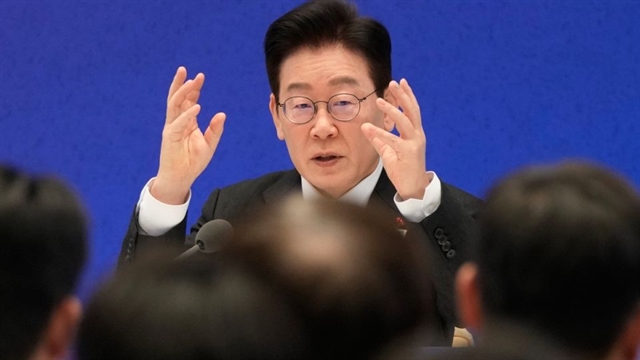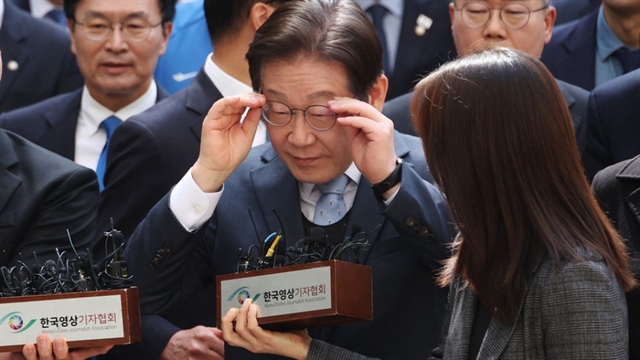 World
World


|
| Lee Jae-myung, leader of South Korea's main opposition Democratic Party, arrives to court in Seoul on March 26, 2025. — AFP/ANN Photo |
SEOUL — With less than 50 days left until the June 3 presidential election, South Korea’s two largest parties, the Democratic Party of Korea and People Power Party, have opened their primary races to choose their presidential nominees.
The early presidential election takes place after the Constitutional Court’s unanimous ruling to confirm the impeachment of former President Yoon Suk Yeol over his botched martial law declaration in December.
The Democratic Party has so far seen just two candidates — Kim Kyung-soo, a close aide of former President Moon Jae-in, and Kim Dong-yeon, the Gyeonggi Province governor — joining the primary in addition to Rep. Lee Jae-myung, the party’s former leader who appears on a glide path to win the nomination.
Lee, who still has court dates in the run-up to the election, is taking a low-key approach ahead of the party’s primary, minimising in-person schedules until the nomination is finalised. He announced his presidential bid through a YouTube video.
Only a select few reporters have access to events he attends, unlike other candidates who give the press open access. He also is keeping a slim campaign team comprised of party insiders.
Gyeonggi Province Gov. Kim is targeting younger voters with policy proposals of flexible working hours and a gradual lifting of compulsory military service for men, with a move to volunteer recruitment that includes women.
The People Power Party, which has a larger pool of contenders, will hold a public vote to whittle down the field to four top choices by April 22, before getting that down to the final two by April 29. The nominee will be finalised on May 3.
So far high-profile names on the People Power Party primary ticket include Kim Moon-soo, who was until recently Yoon’s labour minister; Hong Joon-pyo, who resigned as mayor of conservative stronghold Daegu to run for president; Han Dong-hoon, who stepped down as People Power Party leader after Yoon’s martial law debacle; five-time Rep. Na Kyung-won; and Rep. Ahn Cheol-soo, who headed Yoon’s transition team.
Acting President Han Duck-soo will not be entering the primary, Rep. Kweon Seong-dong, the People Power Party’s floor leader, said Tuesday, ending speculation over whether he would.
"Let’s remember that this presidential primary should be about picking the right person to bring Lee Jae-myung to justice. That is the common mission shared by all of us," Kweon said. "All of this ado about the acting president joining the race helps nobody."
The People Power Party candidates have been rallying around an "anti-Lee Jae-myung" agenda, each campaigning to defeat the former Democratic Party leader who currently holds a significant lead over his conservative challengers.
The rules for the Democratic Party primary, announced over the weekend, also sparked complaints from candidates who feel Lee’s popularity with the party’s registered voters is a difficult hurdle to clear.
The Democratic Party is limiting voter eligibility in its primary to "block outside interference" in the nomination process. All primary contenders except Lee have pushed back against the decision, arguing that broadening participation among registered party members would help ensure the nominee reflects the will of all South Koreans.
The rules prompted one of the contenders, former lawmaker Kim Doo-kwan, to drop out. Kim said that the Democratic Party traditionally has opened up its primaries to all voters across party affiliations.
"When have we ever had a primary that restricted participation?" he posed Monday.
Rep. Park Chan-dae, the Democratic Party’s acting leader, said at a meeting of the party leadership on Tuesday that the rules for the closed primary were meant to "ensure a winner who is more aligned with the party."
The Democratic Party will pick its final nominee on April 27 or May 1.
The People Power Party, on the other hand, said it would be opening up the first round of its primary to let unaffiliated voters participate in picking their preferred candidate for the party to nominate.
This was to have a "nonpartisan primary," the party explained.
Outside the two biggest parties, minor Reform Party Rep. Lee Jun-seok, who led Yoon’s presidential campaign when he was then leader of the People Power Party, has already hit the campaign trail. — ANN

.jpg)


